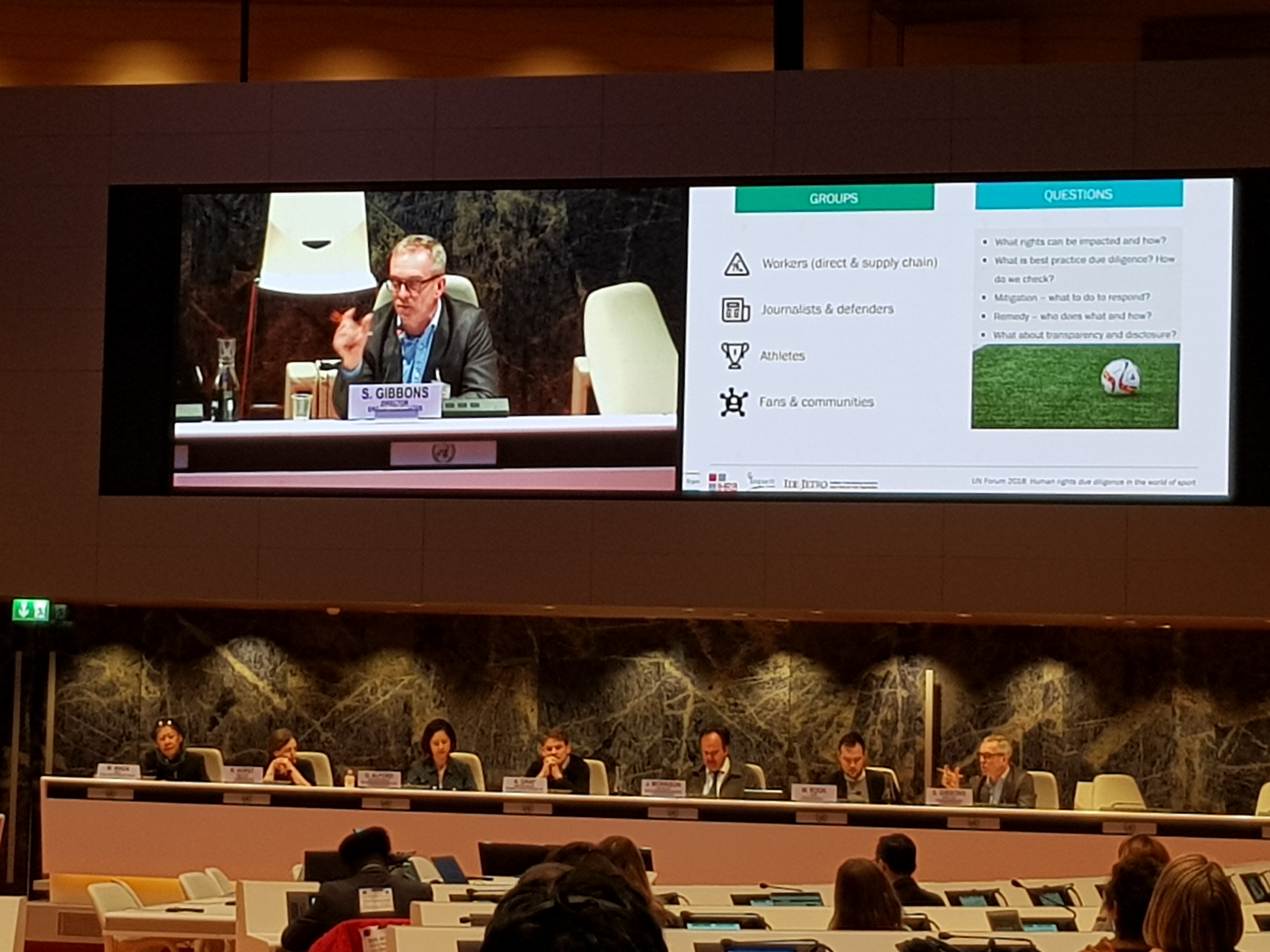What happens in Geneva… some thoughts on the UN Forum
Posted by Macduy Ngo

The programme for this year’s UN Forum on Business and Human Rights included an impressive range of topics, reflecting the relevance of human rights considerations across disparate disciplines and subject areas. Ergon had the privilege of co-facilitating two sessions – one involving human rights in sport, the other involving labour issues in oil and gas – and the broader Forum agenda included perspectives from climate change specialists, tech industry experts, pharmaceutical companies, and most importantly human rights defenders and affected communities and workers.
While this breadth suggests that many different groups are coming to grips with the human rights challenges in their area, it is less clear if viable solutions and real positive impacts are coming to light. Six years after the first Forum, the need to bridge the gap between policy and practice continues to be a common refrain. Seven thoughts come to mind as the Forum concludes:
- This year’s Forum set a record for private sector attendance, with private sector participants accounting for one-third of all attendees. The significance of this is open to speculation, and while there was a sense that the vocabulary of human rights is increasingly finding its way into the board rooms of multi-national enterprises, national enterprises – some of whom are significant in size – remain a noticeable blind-spot in terms of UNGPs awareness and sources of notable practice. Similarly, smaller and medium-sized enterprises are rarely present in the debate. Reaching these enterprises is undoubtedly difficult, but it may be that government procurement rules which incorporate human rights due diligence requirements could have demonstrable impacts on these businesses.
- While there was an uptick in some private sector participation, the voice of government was rarely heard. To the extent that the UNGPs apply equally to states and squarely address their duty to protect human rights under Pillar I (including setting appropriate regulatory requirements on businesses), the question of how to get more government representatives attending, contributing to, and learning from the Forum needs to be a key issue for 2019.
- That is not to say that there has been no action from governments in the realm of business and human rights. Many discussions focused on human rights due diligence legislation, such as France’s Duty of Vigilance law and the UK’s and Australia’s Modern Slavery Acts. However, there was an overriding concern that such enactments can turn into ‘tick box’ exercises as opposed to meaningful due diligence processes. For investors, the EU’s proposed regulation on disclosure of sustainability risks prompted similar conversations. A government representative from Indoenisa discussed how the UNGPs are increasingly informing government policy and legislative decision-making in the spheres of corporate liability and criminal law. These developments are encouraging, although it might be asked how companies (particularly large multinationals) will navigate disclosure and due diligence laws – all of which have slightly different requirements – across myriad jurisdictions. There were inevitable calls for harmonisation.
- Judicial developments were also on the radar for some Forum participants, particularly in connection with parent company liability for human rights violations further down the supply chain. The UNGPs as a form of ‘soft law’ were discussed in the context of corporate liability and an interesting session explored some recent judgments, with judicial approaches remaining tentative at best. The positioning of the UNGPs within this evolving landscape is far from certain, and it is unclear if soft law will be imbued with a harder edge.
- The central theme for the Forum was ‘business respect for human rights – building on what works’, an acknowledgment that there is a strong appetite for practical guidance. Although the UNGPs (as well as the human rights agenda more broadly) have matured over recent years, it is still unclear what ‘good’ looks like and the number of challenges far outweigh the number of solutions. This could be observed during a session targeted at investors. While some investors expressed a desire to protect human rights and use corporate human rights performance as a basis for decision-making, the vast number of companies in a portfolio, lack of information, confidentiality laws, and limited leverage all present significant obstacles.
- Opportunities to share information between businesses and affected communities, workers, civil society and others remains limited. More dialogue focusing on the ‘situation on the ground’ could supplement the inevitable considerations of high-level process, policy, and theory that happen at an international forum. Building opportunities for conversations that go beyond formal position statements is not easy, but the structure and format of many sessions, including the physical nature of the rooms, is not conducive to this. The technology was good this year, but more could be done in organising sessions to match business, government and civil society participants in order to promote discussion.
- There is a sense that principles need to be brought down to earth. While discussions and debates were of a high quality, they are almost always situated at a certain level of abstraction. Herein lies a significant disjunct. International organisations and multinational companies talk at an international level (where they operate) whereas human rights defenders and national companies operate at the project level and need language and solutions which are suitable for a different context. It is all well and good having great policies and international partnerships, but if negative impacts happen on the ground which could and should have been prevented, the gap between policy and practice need to be reviewed and resolved. Making sure that what happens in Geneva does not stay in Geneva is probably the biggest challenge for future forums.